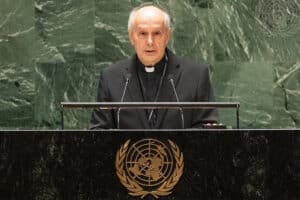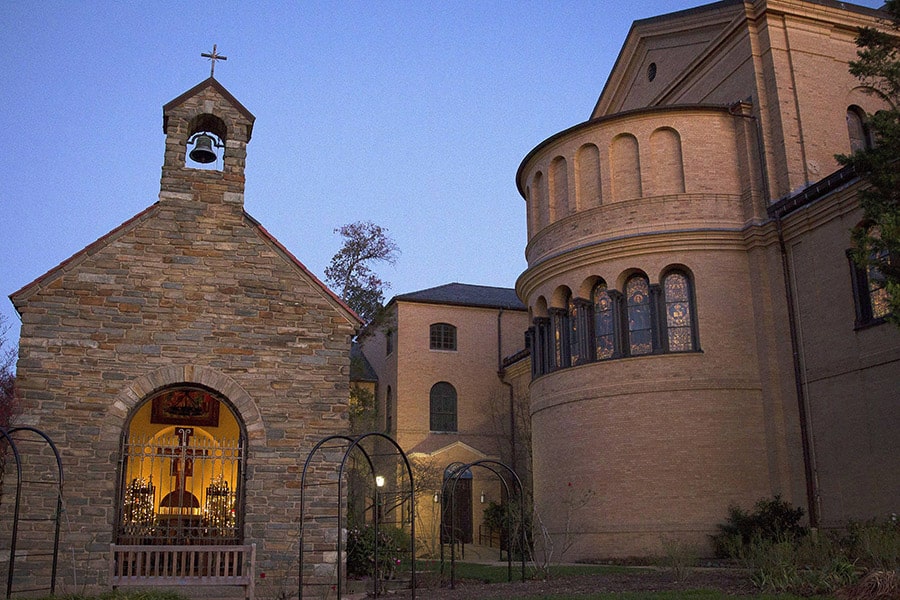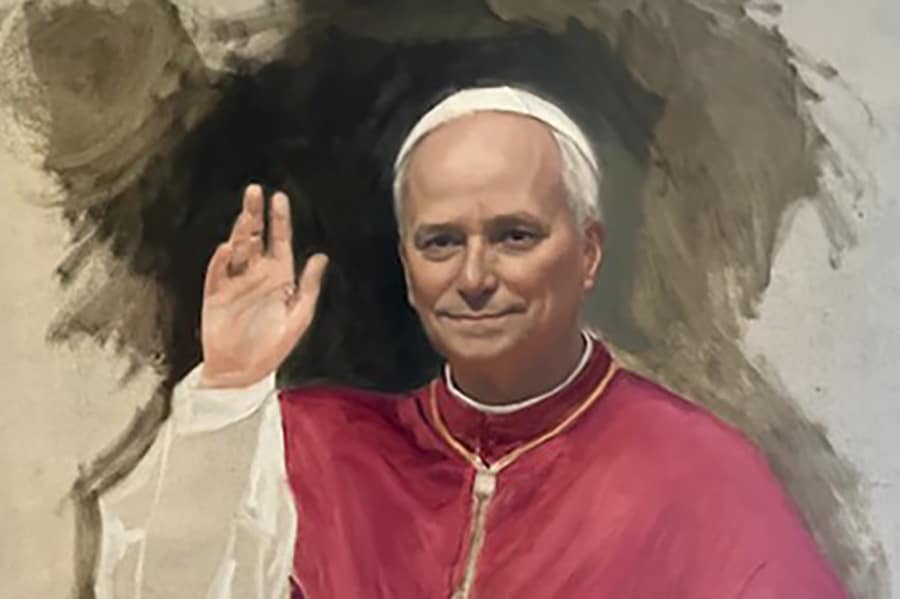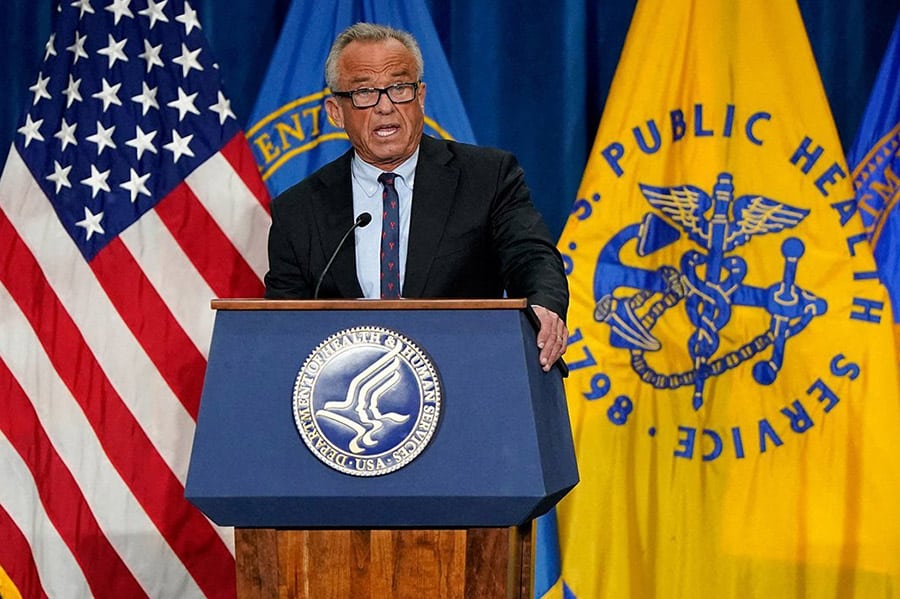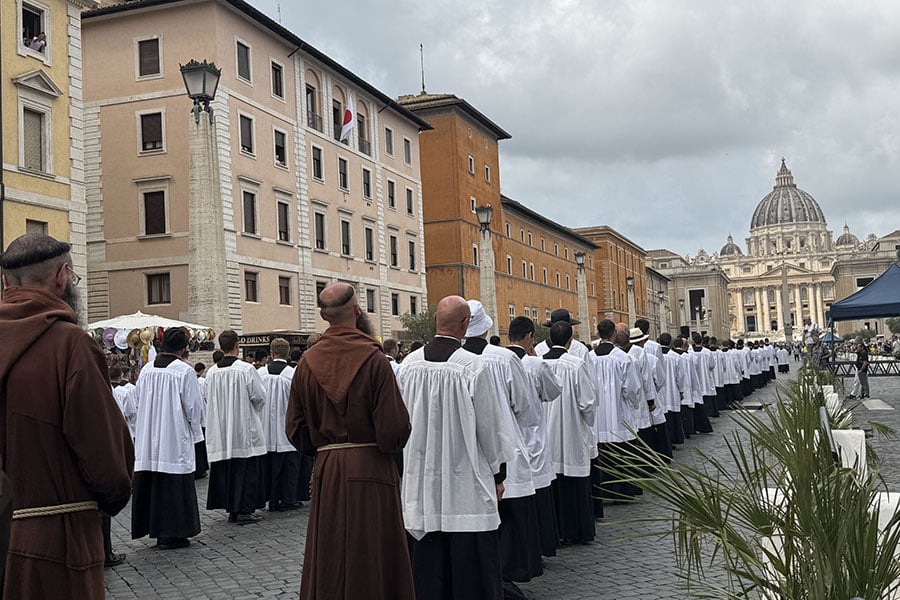The Holy See’s diplomat to the United Nations has reiterated a call to end nuclear proliferation, saying the best way to honor the late Pope Francis is to “rediscover the spirit” that created the global organization following World War II, and collaboratively strive for peace.
Archbishop Gabriele Caccia, the Holy See’s U.N. permanent observer, shared his thoughts in two April 29 addresses at the U.N.’s New York headquarters.
At a plenary meeting of the U.N. General Assembly convened to commemorate Pope Francis — who died April 21 at age 88 — Archbishop Caccia stressed the late pontiff “recognized the fundamental importance of multilateralism, with the U.N. at its center.”

While “not afraid to highlight the need” for what he’d called “reform and adaptation,” the late pope was “clear” that the U.N. was necessary, said Archbishop Caccia.
He cited three key moments that demonstrated Pope Francis’ belief in the importance of the U.N. — the late pope’s Sept. 25, 2015, address to the U.N. General Assembly, delivered amid an apostolic journey to the U.S. and Cuba; a joint statement Pope Francis issued with U.N. Secretary-General António Guterres in 2020; and the iconic March 27, 2020, prayer of Pope Francis during the COVID-19 pandemic.
The pandemic prayer in particular — which saw a solitary Pope Francis praying for the world from an empty St. Peter’s Square amid the rain — vividly illustrated global interdependence, said Archbishop Caccia. He added that Pope Francis had also warned of an “uncontained pandemic, a moral one, which he defined as ‘the globalization of indifference.'”
Such indifference, coupled with fear, has led to an increased “erosion of international peace and security, widespread political instability and a growing disregard for multilateralism and international law,” said Archbishop Caccia, speaking April 29 during the U.N. general debate on the Treaty on the Prohibition of Nuclear Weapons.
Adopted by the U.N. in 2017, the treaty serves as a legally binding instrument towards the total elimination of nuclear weapons. To date, there are 94 state signatories and 73 states party to the treaty.
Neither the United States or Russia, which together account for approximately 88 percent of the world’s nuclear weapons, have adopted the treaty.
“Conflicts continue to erupt and to intensify in various regions, further exacerbating global tensions and human suffering, especially among those in the most vulnerable situations,” Archbishop Caccia said.
Currently, more than 120 conflicts are taking place throughout the world, according to the International Committee of the Red Cross. Among the most prominent are Russia’s war in Ukraine; the Israel-Hamas war; civil wars in Myanmar and Sudan; insurgencies in various African nations, as well as in Afghanistan and Pakistan; and armed gang violence that has destabilized Haiti.
Military spending has soared worldwide, with the global total reaching a record high of close to $2.5 trillion in 2024, up more than 7% from 2023 and averaging just under 2% of nations’ gross domestic product. The European Union, the United Kingdom and Canada have accelerated defense investments, as the U.S. under the Trump administration has unsettled longstanding defense alliances.
Yet, said Archbishop Caccia, “international peace cannot rest on a false sense of security based on the threat of mutual destruction, total annihilation or the fragile balance of military powers.”
Rather, “the international community has a moral responsibility to advance disarmament, particularly in light of the rapid evolution of delivery systems and cybertechnologies,” he said.
The archbishop underscored the “urgent need” to prioritize disarmament, with military spending redirected for peaceful purposes through a global fund dedicated to hunger elimination and development for emerging nations — a proposal the Holy See had previously advanced.
Archbishop Caccia once again urged nations to adopt the U.N.’s treaty against nuclear proliferation.
“Even as the winds of war blow with renewed force and fear threatens to overshadow peace and human fraternity,” he said, “a world free of nuclear weapons is not only possible, but necessary.”
Read More World News
What can the Year of St. Francis do for the world? A lot, say these Franciscans
After Pope Leo XIV proclaimed the Jubilee Year of St. Francis from Jan. 10, 2026, to Jan. 10, 2027, the Vatican’s Apostolic Penitentiary also issued a decree granting a plenary indulgence to mark the 800th anniversary year of the popular saint’s death.
Continue Reading What can the Year of St. Francis do for the world? A lot, say these Franciscans
Artist prays daily for Pope Leo XIV after painting his portrait for U.S. seminary in Rome
So began the first steps on the artistic road that led Moran, 62, a parishioner of Our Lady of Grace in Edina, to complete an oil painting of Pope Leo for the refectory of the Pontifical North American College, the major seminary for American seminarians studying in Rome.
As France holds day of prayer for people at the end of life, world’s euthanasia numbers soar
As Catholics in France prepare for a nationwide prayer and fasting initiative Feb. 20 in anticipation of the final vote on a bill that “leads our country down the path of euthanasia and assisted suicide” and to “ask the Lord to enlighten consciences on the gravity of the challenges posed by this proposed law” — numbers of euthanasia procedures spike around the world.
Key pro-life group warns lack of action on Hyde, mifepristone may ‘demotivate’ Republican voters
A key national pro-life group released polling Feb. 19 it said shows a potential failure by the Trump administration to act on pro-life policy priorities may demotivate Republican primary voters in the upcoming midterm elections.
Lawmakers, attorneys general back abortion pill challenge DOJ wants to pause
Twenty-one state attorneys general and 60 members of Congress were among the Republicans who filed amicus briefs in support of Louisiana’s efforts to roll back the Biden administration’s eased restrictions on mifepristone, a drug commonly, but not exclusively, used for most first trimester abortions.
Continue Reading Lawmakers, attorneys general back abortion pill challenge DOJ wants to pause
SSPX rejects Vatican dialogue, plans to consecrate bishops without papal mandate
The Society of St. Pius X has rejected a Vatican offer of dialogue and said it will move forward with plans to ordain bishops without a papal mandate this summer.
Continue Reading SSPX rejects Vatican dialogue, plans to consecrate bishops without papal mandate
Copyright © 2025 OSV News
